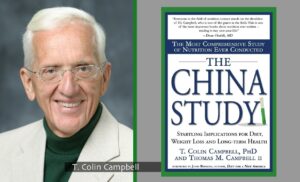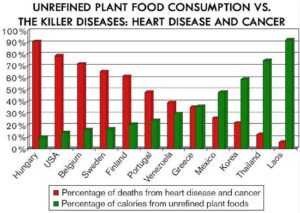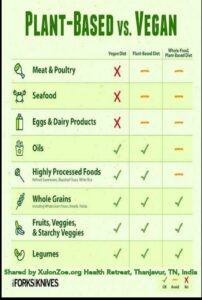Whole food plant-based diet (WFPB diet) is a lifestyle by eating whole grains, vegetables, fruits, and fewer nuts in the diet. Those who follow WFPB diet avoid eating refined grains, vegetable oil, animal-based food like meat, eggs, and dairy products. It may appear like veganism, but vegans use vegetable oil and processed grains. Hence veganism is one kind of unhealthy Lifestyle. Whole food plant-based diet can be achieved by eating well-cooked unrefined grains, vegetables, and fruits.
There is no clear definition for what constitutes a whole-foods, plant-based diet. This diet is low in fat, nuts are taken in very little quantity. One important thing in the WFPB diet is most people develop B12 deficiency in a few months. So people who switch to whole food plant-based diet must take B12 supplements weekly or take B12 fortified foods often.
1. How WFPB Diet Came to Exist

It's coined by Dr. T. Colin Campbell, an American nutritional biochemist who specializes in the effect of nutrition on long-term health. He has received an award from the American Institute of Cancer Research, in 1998, "In recognition of a lifetime of significant accomplishments in scientific research...in diet, nutrition, and cancer". In the early 1980s, about 1982 He was a member of a 13-member expert committee U.S. National Academy of Sciences (NAS). He had direct laboratory research experience on nutrition and cancer. He was charged with articulating the then-emerging information on Nutrition in the development of Human Cancer. Decided to Coin the term, “Whole Foods, Plant-based Diet”, Low in fat, high fiber, best achieved by consuming vegetables, fruits, and whole grains.
He is the author of The China Study book, hailed as one of the most important books about diet and health ever written. Dr. Colin Campbell conducted the world's largest epidemiological study called The China Study. When he compared the diets and health status of rural Chinese to Americans, he found that that the top killers in the US - coronary heart disease and cancers - were practically absent in Rural China. The rural Chinese population tended to live in the same area all their lives and to consume the same diets unique to each region. His research showed that this was primarily due to their diet and lifestyle. Consumption of Animal foods, which is big part of the standard American diet, seemed to be the top dietary cause of these diseases.
2. How Conventional Diet Causes Chronic Diseases?

Conventional diet is high in trans fat, saturated fat, refined carbohydrate, animal protein; and low in fiber. Also lacks vitamins, trace-minerals, and anti-oxidants, which leads to prolonged inflammation in the body 24 * 7. This leads to insulin resistance, plagues in blood vessels, and inflammation of various organs in the body. When the body is no longer able to bear the abuses done to it on daily basis leads to Chronic diseases.
3. what Whole Food Plant-based Diet, Will do for You?

It helps to prevent, reverse and treat chronic diseases like cancer, diabetes, high blood pressure, obesity, asthma, arthritis, bowel diseases, etc. The phytochemicals in the Whole Plant-based diet acts like medicine and heal the body without any side effects. Toxins accumulated over the years in the body get expelled eventually and the body gets repaired naturally.
5. Difference between Wholefood Plant-based diet and Vegan

“Whole Food plant-based diet” focuses on health and not on ethics. It consists of plant foods that are whole or minimally refined. The whole food plant-based diet also excludes oils, and refined foods that are made in a factory. But Veganism is generally defined as living in a way that avoids consuming, using, or exploiting animals as much as realistically possible for ethical reasons. Vegans consume vegetable oils and highly refined food in their diet. Hence it's also an unhealthy diet in one way.

